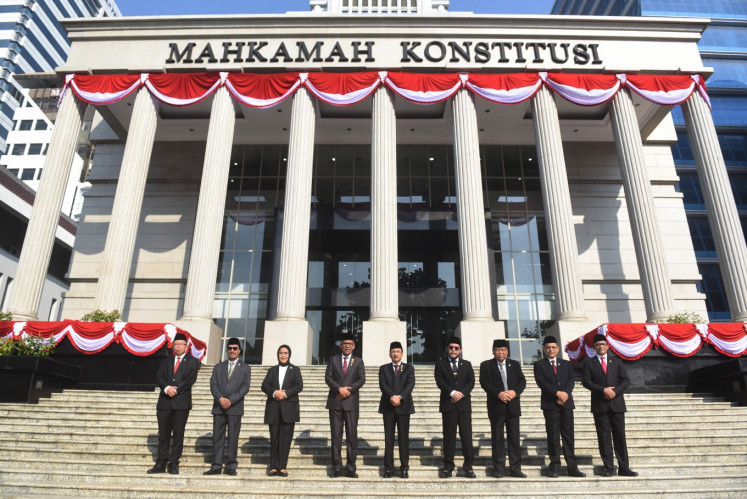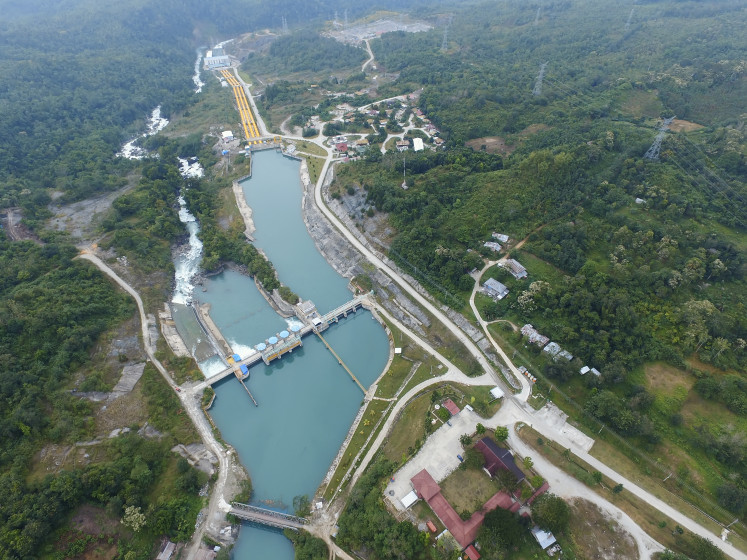Popular Reads
Top Results
Can't find what you're looking for?
View all search resultsPopular Reads
Top Results
Can't find what you're looking for?
View all search resultsInsight: Lebaran: Time of the year for us to give and forgive
This year, Idul Fitri falls on the first day of October
Change text size
Gift Premium Articles
to Anyone

This year, Idul Fitri falls on the first day of October. On this very day, Muslims celebrate the joyous moment of their “return to purity” — the literal meaning of Idul Fitri. This is not something that should be understood only in a symbolic sense, but to some extent it also appears to have a physical manifestation during the time of Lebaran, the Malay term for Idul Fitri.
For the month before this most awaited day, Muslims have been in a training-ground situation by fasting from dawn until dusk, abstaining from food, drink and sexual activities.
More importantly, beyond those physical hardships, Muslims are ordered to exercise patience, restrain anger, control desire, do good deeds and many other things that could purify and strengthen their inner dimension as human beings. In addition to the fact that fasting is a religious obligation, all of these physical and spiritual exercises are meant to make Muslims better individuals.
This quality of being a better person, enriched with the spirit of giving and forgiving, is especially manifest during the joyous time of Lebaran. It might be true that for some Muslims the state of being a better person lasts a long time, but for many others it is short lived.
On the day of celebration, Muslims are encouraged to be happy and thankful. Because of that, the Almighty God is “considerate” enough to stipulate the first day of Idul Fitri as a day when Muslims are in fact forbidden to fast.
It is customary in Malay society and perhaps also in many parts of the Muslim world for Idul Fitri to be celebrated as a conventional festivity: New clothes and good food are typically on display. Many young and not-so-young Muslims like to spice up this moment of celebration by going to various recreational places.
So, like Muslims in neighboring countries and regions, such as Malaysia, Brunei, Singapore, southern Thailand and the Philippines, Indonesian Muslims begin their Idul Fitri celebration by going to mosques or open fields to perform a noncompulsory but highly encouraged collective prayer. While performing this most-celebrated prayer, Muslim women usually wear their new dresses. They will then return home from the prayer to already-laid out special dishes and cookies.
One must not forget, however, that during Lebaran, Muslims are encouraged to renew bonds of friendship and brotherhood. In this regard, the eldest usually stay home, while the much younger parties pay them a visit. On such occasions, it is customary for younger parties to ask for forgiveness for their past mistakes. The elders are then obliged to comply with the request.
As with many other religious holidays, the spirit of Idul Fitri begins to build long before the day of festivities arrives. During the month of fasting, Muslims are encouraged to be generous in giving out some of their wealth to the needy. In addition to personal and property alms that must be given out during the build up to Idul Fitri, Muslims are also strongly advised to give donations to the less fortunate.
This practice of giving continues well into Ramadan, usually until the first few days of Lebaran. Interestingly, this spirit of giving is realized beyond the needy parties. On this day of celebration, children receive some money from their parents, aunts, uncles, grand parents and other close relatives. As Idul Fitri draws closer, employees receive extra wages from their employers. Associates receive comparable gifts from companies.
Throughout history, the practice of giving as part of Idul Fitri celebrations has transgressed the religious dimension.
Lebaran has become something that has socio-cultural, economic, and political significance. As people consume more, the economy grows, and the growing spirit of giving nurtures the distribution of wealth; the surge of willingness to forgive renews and strengthens social bonds and the mass homecoming reenergizes cultures and family ties.
Politically, Lebaran can also serve as a moment when leaders can apologize to their people in the knowledge that the forgiving spirit permeating the period will cause them to be forgiven. In this context, Idul Fitri has gained a momentum where it is the nation, and not only one religious denomination, that actually celebrates the occasion.
If this is the case, then we will witness how the Idul Fitri celebrations can work in tandem with existing socio-cultural, economic and political realities. Happy Lebaran!
The writer is a lecturer at the State Islamic University (UIN), Jakarta). He can be reached at bahtiar_effendy@yahoo.com.









